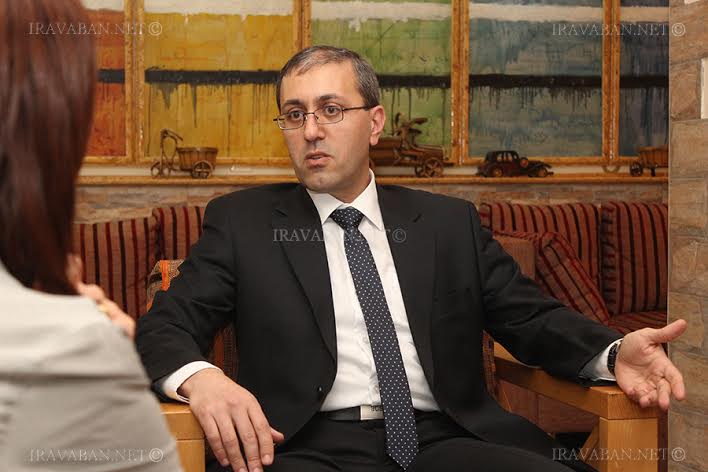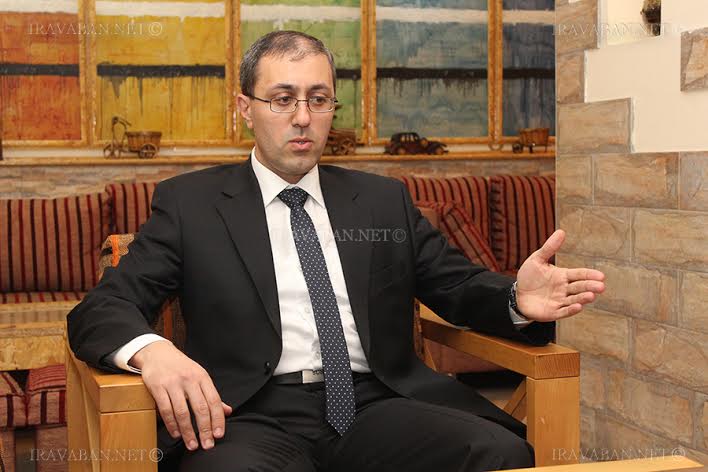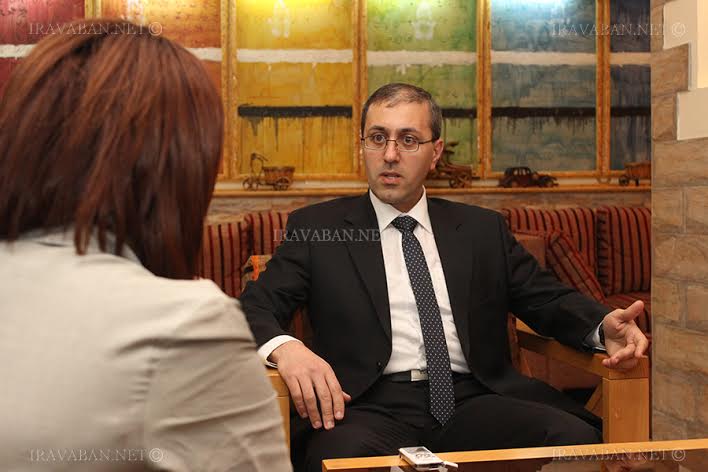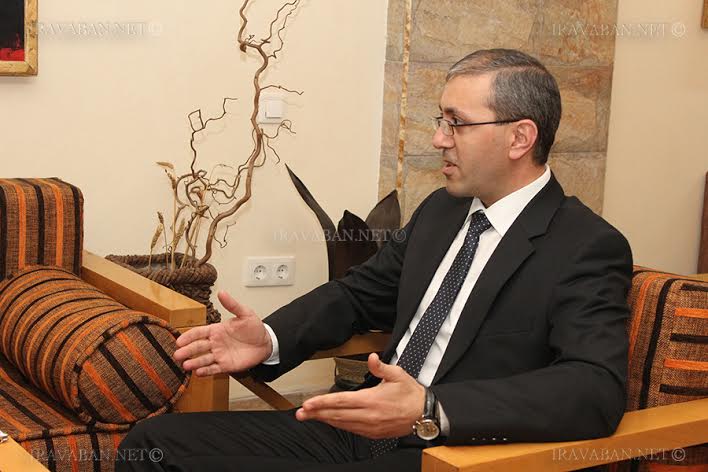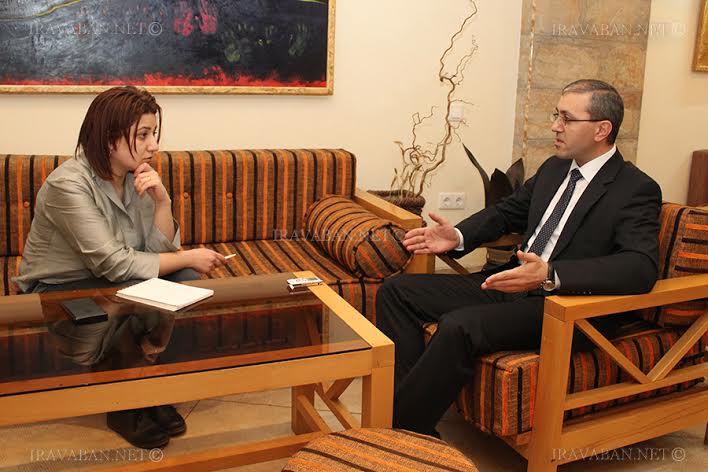The student of a law faculty in Germany feels himself as a lawyer from the very first day of the studies, who constantly writes expert opinions on a conflict in criminal, civil, administrative, constitutional, or other sphere of the law. Gor Hovhannsyan, Doctor of Laws, graduate of Humboldt-University of Berlin said in the interview with Iravaban.net in the scope of the “Law Scholars” project, talking about the issues of differences between the German and Armenian legal education and academic systems.
– Please tell us what you are doing here and in Germany.
– I live in Berlin since 2010. I am a lecturer of State and Constitutional Law at the German and European Constitutional and Administrative Law Department at the University of Hagen. At the same time I am also actively involved in the legislative reforms processes of Armenia. In particular, I am involved in the drafting of amendments to the RA Code of Administrative Offences, with the assistance of the European Union.
– Please speak about the differences between German and Armenian law schools.
– The differences are many. The German educational system is based exclusively on solving the problems. The University students from the first day are involved in solving tasks in different areas of jurisprudence; in addition they pass exams by solving problems exclusively.
In Armenia I studied for a very long time, but did not solve problems. However, problem-solving is something that enables the students finally understands why all this theoretical knowledge is for, and how and where they should be applied. Every legal issue is a conflict taken from life, and it should be solved by the lawyers. And, in fact, the student feels himself a lawyer from the very first day of the studies, who constantly solves a conflict in criminal, civil, administrative, constitutional, or other sphere of the law. I have heard that currently the students at YSU solve problems at least in criminal law; however the Armenian legal education yet lacks the methodology of solving legal problems.
– However, there is position that in Western educational system more emphasis is put on the practice and theory seems to have a secondary meaning.
– The profile of German legal education is the following: there are lectures, which are read by professors, and there are practical lessons. And besides the fact that theoretical knowledge is provided at the lectures, there is also a very rich literature on every subject so that the student has no problem in obtaining theoretical knowledge. In addition, the logic of the legal tasks is built so that the student should know and understand the theory in order to solve them.
– As you work in Germany and have links with Armenia as well, I would like to hear your opinion about the stages of development of jurisprudence in Armenia and Germany.
– I always say that the Armenian law as compared with the law of the developed European countries is on a very low level. There are no edges for comparison of the work of German and Armenian professors. German professors are making considerable scholarly work, it is just amazing. Lecturing at the university for the German professor is a secondary activity. Their main work is conducting scientific research. Here, in Armenia it is just the opposite: the main task for the professor is lecturing at the university. I have heard little about research work. The result is that the jurisprudence is evolving in Germany rapidly, whereas here in Armenia we are dropped behind.
Every time when I came here to lecture, I feel that a number of approaches, opinions, problems are largely unknown in Armenia. Most of our lawyers are not even familiar with elementary legal principles. I can bring many examples from different areas of law. For example, a simple question: how can we define in the administrative law whether the legal relation is a public and private and whether the dispute arising is a private or public legal dispute. Today it is solved with the help of the three main theories: theory of special law, subordination theory and the interests’ theory. At least I have not met any lawyer in Armenia, including a judge at the administrative court, who would know it.
– And why is not known?
– Because it not taught anywhere, it’s probably nothing written in the university textbooks to read and learn.
– Do you mean the Armenian-language literature?
– Yes, I do. And do the Armenian lawyers read literature in the foreign language? If anyone has read for example, German literature they will know for sure…
– … You read. Have you tried to fill this gap?
– I am trying to. For example, I am here for a month and I deliver private lectures on “Legal Methodology” and “Administrative Law”. And my students, who have attended classes, know all these. Of course I am trying to fill in this gap as much as a can. I also often write scientific articles. Since 2009, I have been writing scientific articles about the fact that the fundamental laws constrain our state. In simple terms, for example, when one kills a man, the killer does not violate the victim’s right to life enshrined in the Constitution, because the right to life enshrined in the Constitution applies only to the state. State says not to kill the man, not the person. Only as a result of the 2015 constitutional reform, most lawyers had finally realized that it is so. Whereas Article 3, paragraph 3 of the Constitution, which states that approach already existed in the 2005 edition. In other words, only 10 years later, people realized that the only addressee of the fundamental rights enshrined in the Constitution is the state. And when 6-7 years ago, I wrote that we were wrong about the perceived norm, publication of my articles was prohibited on the reasoning that it is nonsense, and we cannot allow the readers to read such stupid ideas.
– Did they reason that way?
– Something like this was written in the reasoning of rejection of the publication. Naturally, no one will say exactly the real reason for rejection. However, when I had a telephone conversation with the Dean of the Law Faculty of the Academy of Management, whose opinion was the causes of rejection of publication, he only asked a meaningless question, “You criticize the decisions of the Constitutional Court. So, 9 judges do not understand anything there. Do you know better than they do? ”
– Isn’t there any positive development here?
– In our country the laws are being developed with the support of the European institutions, for example with the active support of the German organization GIZ. And as a result, see what happens, the laws are being developed by the German approaches, which is positive, but the result does not change anything, because users do not know what they have taken from Germany. Here is a striking example: The New Draft Criminal Code of the RA, based on the example of Paragraph 35 of the German Criminal Code, provided a new kind of extreme necessity (duress), in which case the person will not be subject to criminal responsibility, if he commits an unlawful act to avert the danger from himself, a relative or person close to him, acts without fault.
Until now, in case of the extreme necessity that we know, the person was not subjected to criminal liability if he saves a legally protected value, by causing harm to another legally protected value but which is of lower cost than the one which he saves. This type of extreme necessity, which always existed in the RA Criminal Code, excludes unlawfulness. This means that if we save value protected by law by damaging any other value of a power price, the society considers our act totally acceptable the low value, this act is not an offense, and is a very normal thing to do.
The new type of extreme necessity, when a person saves his relative’s life or health by inflicting damage to a value protected by the law, excludes the fault of the act and not the unlawfulness. That means the following; the society does not justify the act; the act is still illegal and reprehensible. For example, “A” kills “B” to save a relative. “A” will not be subject to criminal responsibility, but not because the act that was not illegal, but because fault is missing here. The difference between these two types is extreme necessary is that the society does not justify the act committed by “A”, saying you’ve not done something good, but we forgive you (but not justified) because you did it in an extreme situation where it would not be reasonable to expect lawful behavior from you.
This provision has been incorporated the new Draft Criminal Code. However, the Working Group on elaboration of the Code is not aware of this difference. I explain this to them, they say, what’s the difference, eventually the person will not be convicted. It seems that in addition of being unaware of this they even are not interested in it. I think the reason is that the theory naturalistic-causal of action, which still is operational in the Armenian Criminal Law is still being put in the basis of new Criminal Law. This old theory still places the causal process in human behavior, where the only important thing is the physical movement issuing from the voluntary act and not the social content of the incident. The act, according to this theory is the moral behavior of the body, or making changes in the external world on the person’s desire. In Armenia, based on this theory the existence of the crime is being checked by the following multi-stage scheme
1. The object of the corpus delicti (damaged social relationship),
2. The objective side of corpus delicti (an action, result, causality etc.),
3. The subjective side of corpus delicti (the fault in its forms: arson and carelessness, crime motives etc.),
4. The subject of the corpus delicti.
Groundlessness of such a concept of the act has long been acknowledged by the lawyers. Therefore, the causal theory of action is not applied in the German criminal law since World War II. It is replaced by the so-called theory of purposeful action. According to this theory, the act is implementation of the purposeful action, i.e., deliberate, and not simply causal accident, such as the action of murder, theft or damage of property. When, for example, the nurse, not knowing that morphine is too strong and therefore performs lethal injection, which is although performs purposeful injections, but not a deliberate killing.
The existence of a crime in purposeful theory is checked in a three-level scheme
1. Factual circumstances
1. Objective factual circumstances (subject of offense, object, action, result, causality, objective accusation),
2. Subjective factual circumstances (intent),
2. Unlawfulness,
3. Fault:
Without understand the difference between these deep theoretical approaches the correct application of the new type of extreme necessity it will be impossible. Consequently, before taking a new and advanced approach from German or any other country, first it is extremely important to understand the essence of this approach and its theoretical justification for Motherland. In our case it seems that this important issue is ignored while making legislative am to us about making legislative amendments.
– In your opinion, what is the development option?
– We have many young people educated abroad. I was in Nuremberg in January; there I met with two Armenian lawyers. They were newly graduated. One of them was an advocate. They were in Germany for a long time, but they did not have connections. They asked to clarify, whether it was possible to come here to Armenia and contribute as experts in the drafting the laws, and provide expert opinion. I spoke with several officials here, but they were not interested in it. This country does not need smart individuals.
I can tell you my experience. Before coming here, I wrote a letter to the head of the Chair of Criminal Law informing that I shall be in Armenia in a month to deliver private lectures and that I am ready to deliver free lectures to the YSU students for a month as well. And so far I have not received a response. By the way, I wrote him letters to the same address, and he responded to my letters.
I do not think this is a personal matter. Maybe I am wrong. I think it is unacceptable that one may come and explain to the students things which they have no idea about, and as a result they will think that they have learning everything wrong up to now. During private lessons, attended by lawyers, I gave them a task on a criminal law problem. I cannot forget their astonished look. It seemed that they went home under the “Knock out” after that lecture.
– However, will you return and to you have an objective to work here?
– Not to live permanently, as I see no future perspectives here. There are no conditions, so that I can deal with science. I think that at best I shall be able to find a job of an ordinary professor and nothing more. I cannot do scientific work here, because here there is no literature in general.
I provide support to the most possible extent that my abilities provide. I came for a month, delivered private lectures. Several lawyers began to replicate the right and think differently, it is a great achievement.
For some reason, development of science is not encouraged here. In 2013, I came here on the invitation of the School of Advocates and delivered lectures. Then the director was changed and I have not received invitations since then. I learned from private conversations that some people were not pleased with my criticism regarding the law, the judicial acts, and court decisions and I became undesirable person at the School of Advocates.
– And why don’t you represent the criticism more gently, in a so called nicely packaged way?
– I can add an expression to each criticism, which says that of course there are many knowing people in this or that institution. But I do not add it because it is already clear. I do not soften the criticism, because the objective is to draw attention to the problem. If it is mild, it would not deserve attention. But my criticisms are objective and not directed to persons, but they are perceived as a personal criticism. For example, when you criticize the decision of the Constitutional Court, in its approaches, it is perceived as personal criticism, as if you are criticizing the president and judges of the Constitutional Court. Naturally, this is not so.
– Have you got used to life in Germany, the everyday life?
– Everyday life in Germany is very convenient. I miss Germany, when I leave it for a long time. I miss Germany, even when I go to other European countries as well.
– Usually, one gets used to a foreign country when he is there with the family.
– It is not like that in my case. I am alone, and I have no problem with calling them. Besides, I do not interfere in the lives of others. If my family wanted to come to Germany, they will do it on their own initiative.
– And are you going to marry with an Armenian girl?
– I do not know: Life is unpredictable. I cannot say, but I have no such plans.
Interview by Astghik Karapetyan
Photos by Gevorg Tosunyan
Author of the Idea Karen Zadoyan
Also read:
The Unfair and Not Professional Specialist is Mostly Vulnerable. Artur Ghambaryan
Anna Margaryan about the Criminal Law, Corruption and growth of Criminality
Tariel Barseghyan about the Mistakes caused by One Word
Problems existing in the Sphere of Criminal Procedure Law: Samvel Dilbandyan

